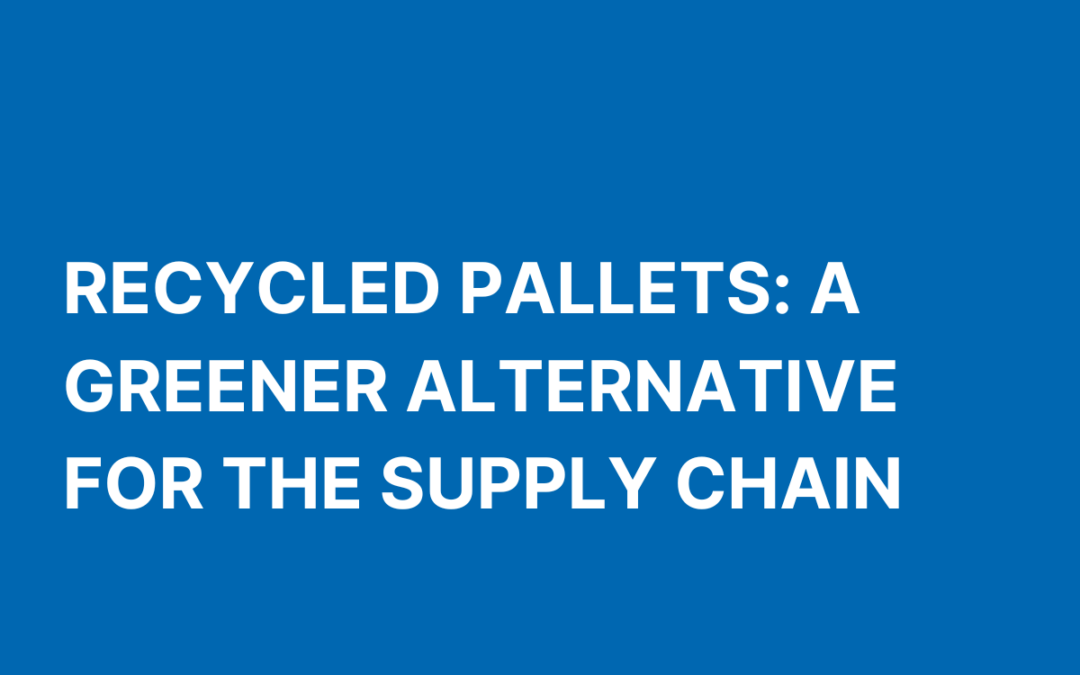When organizations make a commitment to be environmentally and humanely responsible through the complex supply chain, the results can be transformative. Sustainability efforts have far-reaching benefits—from employees and stakeholders to local communities and beyond.
Durable wooden pallets are commonplace in the global supply chain, carrying vital goods between warehouses, suppliers, and customers. According to the National Wooden Pallet and Container Association, approximately two billion pallets are used daily in the United States alone. This sizable number clearly necessitates the need for longstanding environmental concern and sustainability practices.
Recycled (or refurbished) wood pallets are ideal for the circular economy. Unlike the archaic “take-make-dispose” model, incorporating recycled pallets into the supply chain offers several environmental and economic benefits including:
Environmental advantages:
- Decreases your organization’s carbon footprint – Building new pallets requires a substantial amount of energy and natural resources. By expanding the pallet lifecycle, organizations are demonstrating their commitment to conserving resources and saving the planet.
- Lowers the amount of unnecessary waste in landfills – Reducing, reusing, and recycling decreases the amount of unnecessary waste.
- Reduces the demand for freshly cut timber – Helps mitigate the negative effects of deforestation.
Economic benefits:
- Propels savings – Estimates indicate that a recycled pallet can cost about 30% less than a new pallet.
- Reduces procurement expenses – Recycled pallets are available at a lower cost; helps reduce procurement expenses for businesses.
- Stretches budgets farther – When businesses save money from a pallet recycling initiative, savings can be reinvested elsewhere.
Generate and cultivate an environment of sustainable improvement
Integrating recycled wooden pallets into supply chains represents a positive shift toward sustainability and a greener future. Use all the tools in your toolbox to evaluate sustainability efforts at every step of the supply chain. Encourage suppliers/partners to follow your lead (if they have not done so already).
Kem Krest is proud to participate in Kamp’s eco-friendly pallet recycling program. It is another example of how Kem Krest is committed to sustainable practices that help protect our planet.
About Kem Krest
Kem Krest, a certified minority business enterprise (MBE), is the nation’s leading provider of supply chain optimization solutions to automotive, powersports, and heavy-duty OEMs. Through our dedicated team members, lean operating system, and streamlined technology, Kem Krest ensures a resilient and uninterrupted supply chain for the programs we manage. Through customized end to end solutions that address every facet of the supply chain—from inventory management, fulfillment, warehousing, kitting, packaging, logistics, and transportation management, Kem Krest enables companies to increase operational efficiency, deliver superior customer and employee experiences, focus on growth initiatives, and achieve cost savings. Kem Krest partners with companies to virtualize their supply chains through a growing network of 12 facilities in the US and Canada, featuring 1.75M sq. ft. of warehouse space and 600+ full-time team members. For more information, please visit Kem Krest’s website at KemKrest.com.

